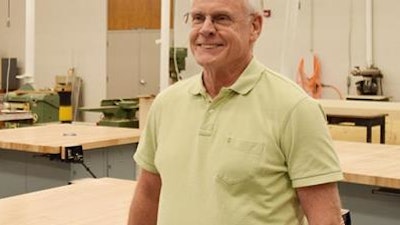
VINCENNES, Ind. (AP) — When administrators with the South Knox School Corp. embarked last year on a corporation-wide $15 million renovation project, long-time shop teacher Bob Greene wanted nothing to do with it.
"They wanted to move this wall over here and that one over there," Greene said, gesturing wildly inside his wood shop, sawdust covering just about anything that stood still long enough.
"But I tell ya," he said with a mischievous smile, "I raised so much cain, they eventually said, 'Eh, I don't want to fight with him anymore!' and left it all alone.
"I did get some new toys, though," he said, his eyes bright.
Principal David Couchenour still laughs at the memory.
"Yep, that's pretty much exactly what happened," he said, shaking his head. "We decided to just let him be."
At 72, Bob Greene proudly considers himself "old-school." He's been teaching "shop" classes for more than 50 years, and while he's resisted some changes — like the movement of walls — he's embraced others.
Over the last five decades, he's watched the traditional wood-working and mechanical classes shift, the work now driven and fed by ever-changing technologies. Once a refuge where often-troubled students went to vent their frustrations by learning about engines, electricity and plumbing, shop class has evolved into a state-of-the-art learning center where things like robotics and 3-D printing are the norm.
And Greene — with his proud, curmudgeon's attitude still firmly in place— has embraced a balance between both the old and the new worlds.
"I have a 3-D printer, robots, two (computer-aided design) programs — all these new toys. I have great kids, so why would I retire?" Greene asked with a laugh.
"But I've also hung on to the old way of doing things," he said, settling with ease right back into that "old school" mentality. "The world still needs carpenters and plumbers and electricians.
"Technology can't do it all, can it?"
Greene grew up in Palestine, Illinois. He was a stand-out athlete, particularly in football, but he struggled in many of his classes. Like so many others, he sought out the solitude of his shop classes when the going got rough.
"The only things that kept me in high school at all was my shop teacher and football," he said, his arms crossed firmly across his chest. "I hated school. I wasn't a troublemaker, but I always pushed the limits."
He stopped pushing back, however, after a football coach came down hard on him following a scuffle with some teammates. The incident altered his know-it-all attitude, he said, shifting his rather fixed mindset to one of growth and change.
"That was my turnaround in life," he said. "I found out I had more in me than I was getting out. But it took me getting really mad at that football coach to help me discover it.
"I think that's why I'm hard on kids," he said. "I know they have more in them than they're getting out."
Greene graduated high school and went on to study industrial technology at Indiana State University, a plan that allowed him to follow in the footsteps of that shop teacher he so admired.
He taught for one year in Danville, Illinois, he said, until a shop position opened up at South Knox.
He was just 22 when he took the job in 1969.
"He wasn't much older than I was," said Brad Case, a former South Knox superintendent, of the year he had Greene as a shop teacher. "He was old school, but I mean that in a good way. There was no monkey business in his classes. You did the things you were supposed to do, and if you didn't, you suffered the consequences.
"He was a good teacher, a good man," Case said. "He was fun to be around, a cut-up when the time was right."
Case would eventually return to South Knox, this time as Greene's boss for nearly 20 years.
He was much the same, Case said, but also largely different, having embraced new engineering-focused classes and learning right alongside his students.
He is now part of a relatively new pre-engineering and college credit program called Project Lead the Way. He spends half his day teaching with computer-based programs and hands-on technology in things like robotics, surveying and architecture.
He's also championed the inclusion of young girls in his classes; just this week he took several on a field trip to Terre Haute for a "Females in Tech" conference.
"He's adapted to the changes, or at least some changes," Couchenour said with a chuckle. "The kids love him.
"And he loves them."
In the last 51 years, Greene's had more than 3,500 students, he said, and ministered to another 2,500, at least, as a Gideon at the Southwest Region Youth Village.
He's seen more than 35 third-generation students — the grandchildren of some of his first-ever pupils.
His only wish? That his next 50 years are as good as the first.
"People ask me, 'When are you going to quit and retire?'" Greene said. "And I suppose there was a day when I looked forward to it, but I figure when I do, I'm done here. I'm done everywhere.
"I'm the oldest man in the school, but I don't know when I'm going to retire. I'm serious. Every time I think I will, I change my mind."
And for Greene, there are still important skills to be taught, ones the ever-growing arms of technology can never reach.
"I look at these kids," he said with a sigh, "and they just don't have a clue. I lived through a time when everything was hands-on. They don't know the value of hands-on. And I think that's why I'm still teaching.
"I don't think I could have lasted 50 years in a math or history class," he said. "I hated history."






















